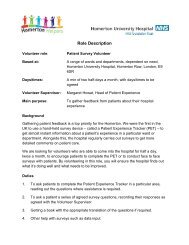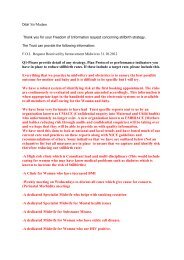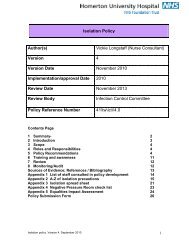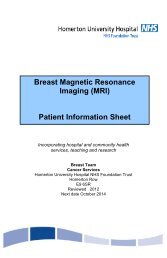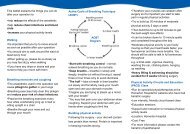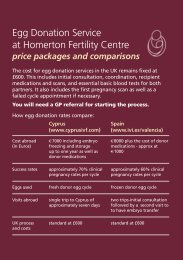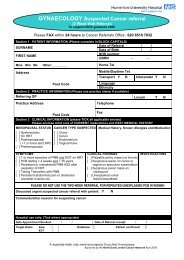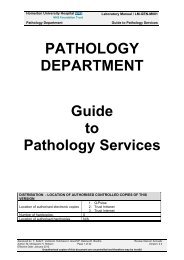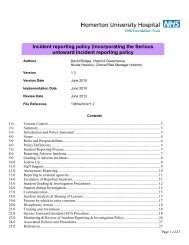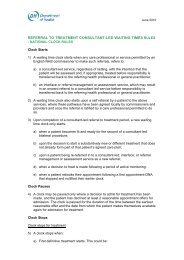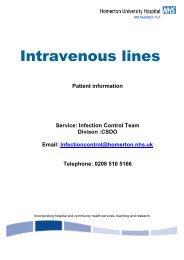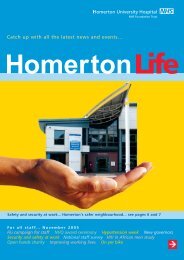Constipation - Homerton University Hospital
Constipation - Homerton University Hospital
Constipation - Homerton University Hospital
Create successful ePaper yourself
Turn your PDF publications into a flip-book with our unique Google optimized e-Paper software.
<strong>Constipation</strong><br />
<strong>Homerton</strong><br />
<strong>Homerton</strong> <strong>University</strong> <strong>Hospital</strong> NHS Foundation Trust<br />
<strong>Homerton</strong> Row, London, E9 6SR<br />
T 020 8510 5555<br />
W www.homerton.nhs.uk<br />
E enquiries@homerton.nhs.uk<br />
Women’s Health Department<br />
<strong>Homerton</strong> <strong>Hospital</strong><br />
Outpatients Physiotherapy: 0208 510 7835<br />
Community Pelvic Floor Dysfunction Service: 0208 510 5914
Signs & Symptoms<br />
- Excessive straining<br />
- Small, dry, hard<br />
stools<br />
- Tummy<br />
ache/bloating<br />
- Pain<br />
- Feeling like you<br />
aren’t finished<br />
- Sore bottom (maybe<br />
bleeding)<br />
- Leaking of liquid or<br />
loose stool<br />
Other things that contribute:<br />
- travel<br />
- pregnancy<br />
- change in diet<br />
- repeatedly ignoring the<br />
urge to open your bowels<br />
- lack of interest in eating<br />
- lots of convenience foods<br />
- getting older<br />
- poor teeth so unable to<br />
chew harder foods.<br />
What is constipation<br />
<strong>Constipation</strong> is having difficulty opening<br />
your bowels. This usually leads to you<br />
going to the toilet less often.<br />
It is normal to open your bowels anywhere<br />
between 3 times a day to 3 times a week –<br />
it doesn’t matter how often is normal for<br />
you, the problem arises when you become<br />
less frequent and need to strain.<br />
It is normal to get this occasionally, but if<br />
you need to strain more than a quarter of<br />
the time it becomes a problem.<br />
Causes<br />
There may be several causes, possibly<br />
happening at the same time. The most<br />
common are:<br />
- inadequate fibre intake in the diet<br />
- inadequate fluid intake<br />
- a sedentary lifestyle<br />
- environmental changes<br />
- lifestyle/routine changes<br />
- certain medications e.g. painkillers<br />
(especially if they contain codeine or<br />
morphine)<br />
If you have pain, e.g. from hemorrhoids,<br />
abscesses, fistulae or following some<br />
surgery in the area this can cause people<br />
to ‘hold on’. See your doctor for advice<br />
about this.<br />
The correct position for opening<br />
your bowels<br />
<strong>Homerton</strong> <strong>University</strong> <strong>Hospital</strong> Leaflet Title > 2
Laxatives<br />
Many people believe that laxatives are the cure for<br />
constipation. But long term or excessive use of<br />
laxatives is not usually necessary and can be habit<br />
forming – the body begins to rely on them to bring on<br />
bowel movements and over time, the natural emptying<br />
mechanism fails to work without the help of these<br />
drugs.<br />
There are many different types of laxative available –<br />
they usually should only be used for a short time –<br />
discuss with your GP if you have any queries about<br />
what you are taking.<br />
FACTS!<br />
Around 80% of<br />
people suffer<br />
with constipation<br />
at some point in<br />
their lives.<br />
Older people are<br />
5 times more<br />
likely to report<br />
problems with<br />
constipation than<br />
younger people<br />
Good Foods<br />
It is widely known that we should be aiming to<br />
eat five portions of fruit and vegetables a day –<br />
this would certainly make up your required<br />
amount of daily fibre (approx. 18g a day).<br />
Foods high in dietary fibre are:<br />
- Cereals containing wholeweat, wholegrain,<br />
bran<br />
- Wholemeal bread or high fibre white<br />
- Porridge oats<br />
- Root vegetables<br />
- Potatoes with skin e.g. jacket potatoes<br />
- Fruit with skin e.g. apples, pears, grapes<br />
- Dried fruit e.g. currents, raisins, prunes,<br />
dates, figs<br />
- Fibre containing biscuits e.g. digestive,<br />
garibaldi, fig rolls<br />
- Peas, beans, lentils and nuts<br />
- Linseeds (usually available from healthfood<br />
shops)<br />
Water – why should you drink more<br />
Your body needs 1.5-2 litres of fluid (approximately 6-8 glasses) to<br />
function during each day. Without sufficient fluids, waste matter<br />
dries out making it harder to move through the bowel.<br />
Any type of liquid can be included but caffeinated drinks should be<br />
kept to a minimum<br />
<strong>Homerton</strong> <strong>University</strong> <strong>Hospital</strong> Leaflet Title > 2
Treatment<br />
Often simply increasing the amount of water and fibre in your diet<br />
can really improve your symptoms.<br />
Bowel and food diary<br />
This can be useful to analyse in a bit more detail what you eat, when<br />
you go and what happens when you do.<br />
The key is balance – you don’t want to increase your daily intake by<br />
simply sprinkling bran over everything… try and gradually introduce<br />
foods high in fibre.<br />
Date<br />
5<br />
Food<br />
Drink<br />
Bowels<br />
Opened<br />
Consistency<br />
Size<br />
S/M/L<br />
Blood/<br />
mucus<br />
Fibre supplements are often recommended but can take more than 2<br />
weeks to reach full effectiveness. These are neither harmful or habit<br />
forming.<br />
6<br />
7<br />
8<br />
Try to stay active – even taking a brisk walk after dinner can help<br />
tone your muscles, which helps the transit of your food.<br />
9<br />
10<br />
11<br />
Try not to ‘hold on’ or put off going for long periods of time –<br />
sometimes this cannot be helped, but the longer your stool spends<br />
inside your body, the more water gets absorbed from it and the<br />
harder it gets.<br />
Midday<br />
1<br />
2<br />
3<br />
Warning signs<br />
4<br />
5<br />
There are certain things you should get checked out by your GP.<br />
6<br />
7<br />
If you have had a change in bowel habit over a few weeks that<br />
can not be explained by a change in diet or lifestyle<br />
8<br />
9<br />
10<br />
Any bleeding or mucus from your back passage should also be<br />
11<br />
investigated.<br />
midnight<br />
1<br />
It is worth knowing that bowel cancer is an uncommon cause of<br />
constipation. Even if you have had constipation over many years<br />
2<br />
3<br />
there is no increased risk of bowel cancer.<br />
4




